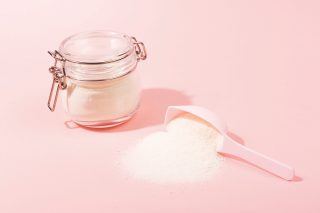Collagen is officially the new Botox, with almost everyone looking to it to address their aging and health concerns. Now, while we know that collagen is good for us, and it’s something that the body needs, it would be hard to ignore how many collagen-based products have popped up all over the place. As such, you might be disillusioned with the idea of collagen peptides, which then raises the question of their efficacy and just how effective collagen peptides are.
So, what are collagen peptides?
Collagen is an abundant protein in the body that makes up about 80% of our skin. It also forms the connective tissue throughout our body. Unfortunately, as things do as they age, collagen levels in the body begin to decline over the years. This then results in the formation of wrinkles, sogginess, and weakened joints.
Therefore, in an effort to address declining collagen levels, many people are looking to collagen peptides. These peptides are made of the same amino acids as collagen, but they are more easily absorbed by our bodies.

HN Collagen
What can collagen peptides do for us?
While studies into the benefits of collagen peptides are still ongoing, research has shown that there are a few ways in which collagen can help our bodies.
1. Improve joint health
In regards to joint health, certain conditions like osteoarthritis can cause the cartilage between joints to wear away, and this then leads to pain, inflammation, and stiffness. As collagen makes up the cartilage that covers the ends of your joints and helps them move, then including peptides in your diet may be exactly what you need to help them.
For instance, a study published in the Journal of the Science of Food and Agriculture demonstrated that collagen peptides can work for the management of osteoarthritis and maintenance of joint health.
Additionally, another study found that participants who took 2 grams of BioCell — a brand of hydrolyzed type-II collagen — daily for 10 weeks experienced better management of osteoarthritis-associated symptoms, thereby improving their activities of daily living. It should be mentioned that this study was funded by the manufacturers of BioCell.
2. Healthy skin and hair
According to the Dermato-Endocrinology journal, we lose at least 1% of collagen every year. This loss eventually contributes to pronounced signs of aging that include fine lines and wrinkles.
Yes, more (and unbiased) research is definitely needed. However, there have been studies displaying that collagen really is the new Botox.

goodluz/shutterstock
According to a 2019 systematic review published in the Journal of Drugs in Dermatology, oral collagen supplements were found to increase skin elasticity, hydration, and dermal collagen density – all of which can help to prevent as well as ease the appearance of wrinkles.
3. Muscle improvement
Collagen and your muscles are intricately connected, so if you’re worried about muscle loss and muscle growth, then you might want to look at collagen peptides.
Considering that a recent study published in Amino Acids found that collagen peptide supplementation led to a modest but significant improvement in muscle recovery, you might want to consider swapping out your protein shakes for collagen peptides.
So, do they work?
There is research out there sharing the efficiency of collagen peptides, but some of these studies are funded by companies that make the product, hence the risk of bias.
However, that doesn’t necessarily mean that the purported benefits aren’t possible, especially because the findings seem to be pretty consistent across the board.
How to choose a collagen peptide
Dare to say it, but the market is quite over-saturated with collagen products, and it can be easy to find yourself sucked into the hype. So, if you’re looking for collagen peptides, but are unsure of where to start, here are a few tips for choosing the right collagen peptide.
-
Choose a reliable seller
The easiest way to ensure that you get value for money is to buy your supplement from a trusted source, such as your dermatologist. Don’t just opt for an online offer if you aren’t sure about the origins.

YuliaLisitsa/Shutterstock
-
Understand the different types and sources
These are the most common types in the body:
- The connective tissues of the skin, bones, teeth, tendons, and ligaments are formed by Type I.
- Type II, which can be found in cartilage.
- Our organs, skin, muscles, and blood vessels get their strength and shape from Type III collagen.
- Type IV: This is a major component of the membranes that separate body tissues.
- Cows produce bovine collagen (which benefits bones, joints, skin, and the gut), while marine collagen comes from fish (which benefits the skin). Porcine collagen, which is high in skin-friendly glycine, is derived from pigs.
Different collagen supplements will contain different amounts of Type I, II, or III collagen, but it’s best that you go for peptides that are high in Types I and III, because this is the main kind of collagen found in the skin.
-
Collagen should be listed as the first and main ingredient
Look for a supplement that lists collagen as the main ingredient. That way, you’ll be getting as much of what you’re paying for as possible.
-
Say No To Additives
Avoid any peptides that contain artificial sweeteners, colorants, or flavorings.
Bottom line
Considering the fact that collagen is one of the main structural proteins in the human body, collagen-based products probably aren’t going anywhere. Supplementing with them may be exactly what we need to do in order to protect our health and longevity. However, it’s important to do your research so that you don’t compromise said longevity by getting lost in a fad.
Read more about collagen and the benefits here: Is Collagen the New Botox?
References
Kumar, S., Sugihara, F., Suzuki, K., Inoue, N. and Venkateswarathirukumara, S. (2015), A double-blind, placebo-controlled, randomised, clinical study on the effectiveness of collagen peptide on osteoarthritis. J. Sci. Food Agric., 95: 702-707. https://doi.org/10.1002/jsfa.6752
Schauss, A., Stenehjem, J., Park, J., Endres, .J.R., Clewell, A. (2012). Effect of the Novel Low Molecular Weight Hydrolyzed Chicken Sternal Cartilage Extract, BioCell Collagen, on Improving Osteoarthritis-Related Symptoms: A Randomized, Double-Blind, Placebo-Controlled Trial. Journal of Agricultural and Food Chemistry 60 (16), 4096-4101 DOI: 10.1021/jf205295u
Choi, F., Sung, C., Juhasz, M., Mesinkovsk, N. (2019). Oral Collagen Supplementation: A Systematic Review of Dermatological Applications. Journal of drugs in dermatology : JDD. 18. 9-16. Ruta Ganceviciene, Aikaterini I. Liakou, Athanasios Theodoridis, Evgenia Makrantonaki & Christos C. Zouboulis (2012) Skin anti-aging strategies, Dermato-Endocrinology, 4:3, 308-319, DOI: 10.4161/derm.22804
Khatri, M., Naughton, R.J., Clifford, T. et al. (2021). The effects of collagen peptide supplementation on body composition, collagen synthesis, and recovery from joint injury and exercise: a systematic review. Amino Acids 53, 1493–1506. https://doi.org/10.1007/s00726-021-03072-x



![women [longevity live]](https://longevitylive.com/wp-content/uploads/2020/01/photo-of-women-walking-down-the-street-1116984-100x100.jpg)










